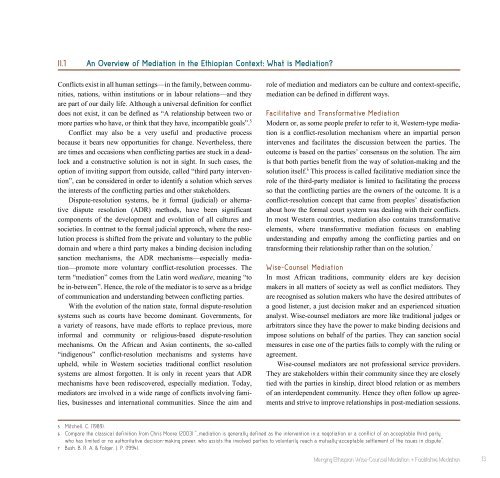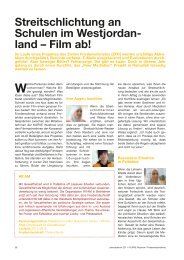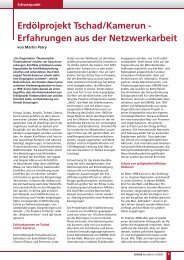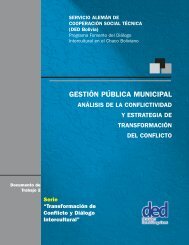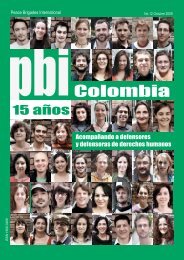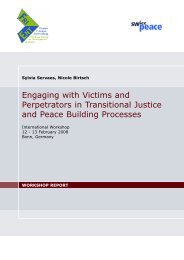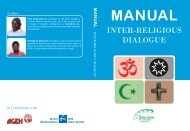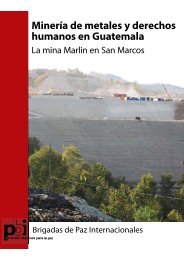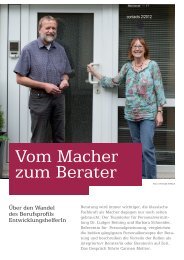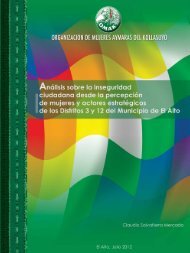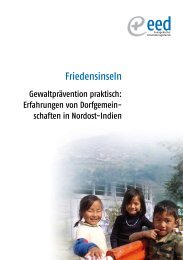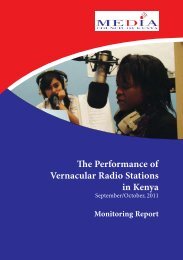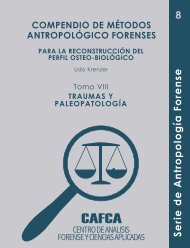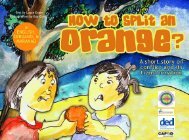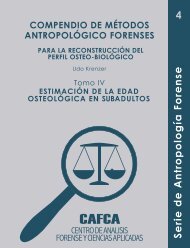Merging Ethiopian Wise-Counsel Mediation and Facilitative ...
Merging Ethiopian Wise-Counsel Mediation and Facilitative ...
Merging Ethiopian Wise-Counsel Mediation and Facilitative ...
- No tags were found...
Create successful ePaper yourself
Turn your PDF publications into a flip-book with our unique Google optimized e-Paper software.
II.1An Overview of <strong>Mediation</strong> in the <strong>Ethiopian</strong> Context: What is <strong>Mediation</strong>?Conflicts exist in all human settings—in the family, between communities,nations, within institutions or in labour relations—<strong>and</strong> theyare part of our daily life. Although a universal definition for conflictdoes not exist, it can be defined as “A relationship between two ormore parties who have, or think that they have, incompatible goals”. 5Conflict may also be a very useful <strong>and</strong> productive processbecause it bears new opportunities for change. Nevertheless, thereare times <strong>and</strong> occasions when conflicting parties are stuck in a deadlock<strong>and</strong> a constructive solution is not in sight. In such cases, theoption of inviting support from outside, called “third party intervention”,can be considered in order to identify a solution which servesthe interests of the conflicting parties <strong>and</strong> other stakeholders.Dispute-resolution systems, be it formal (judicial) or alternativedispute resolution (ADR) methods, have been significantcomponents of the development <strong>and</strong> evolution of all cultures <strong>and</strong>societies. In contrast to the formal judicial approach, where the resolutionprocess is shifted from the private <strong>and</strong> voluntary to the publicdomain <strong>and</strong> where a third party makes a binding decision includingsanction mechanisms, the ADR mechanisms—especially mediation—promotemore voluntary conflict-resolution processes. Theterm “mediation” comes from the Latin word mediare, meaning “tobe in-between”. Hence, the role of the mediator is to serve as a bridgeof communication <strong>and</strong> underst<strong>and</strong>ing between conflicting parties.With the evolution of the nation state, formal dispute-resolutionsystems such as courts have become dominant. Governments, fora variety of reasons, have made efforts to replace previous, moreinformal <strong>and</strong> community or religious-based dispute-resolutionmechanisms. On the African <strong>and</strong> Asian continents, the so-called“indigenous” conflict-resolution mechanisms <strong>and</strong> systems haveupheld, while in Western societies traditional conflict resolutionsystems are almost forgotten. It is only in recent years that ADRmechanisms have been rediscovered, especially mediation. Today,mediators are involved in a wide range of conflicts involving families,businesses <strong>and</strong> international communities. Since the aim <strong>and</strong>role of mediation <strong>and</strong> mediators can be culture <strong>and</strong> context-specific,mediation can be defined in different ways.<strong>Facilitative</strong> <strong>and</strong> Transformative <strong>Mediation</strong>Modern or, as some people prefer to refer to it, Western-type mediationis a conflict-resolution mechanism where an impartial personintervenes <strong>and</strong> facilitates the discussion between the parties. Theoutcome is based on the parties’ consensus on the solution. The aimis that both parties benefit from the way of solution-making <strong>and</strong> thesolution itself. 6 This process is called facilitative mediation since therole of the third-party mediator is limited to facilitating the processso that the conflicting parties are the owners of the outcome. It is aconflict-resolution concept that came from peoples’ dissatisfactionabout how the formal court system was dealing with their conflicts.In most Western countries, mediation also contains transformativeelements, where transformative mediation focuses on enablingunderst<strong>and</strong>ing <strong>and</strong> empathy among the conflicting parties <strong>and</strong> ontransforming their relationship rather than on the solution. 7<strong>Wise</strong>-<strong>Counsel</strong> <strong>Mediation</strong>In most African traditions, community elders are key decisionmakers in all matters of society as well as conflict mediators. Theyare recognised as solution makers who have the desired attributes ofa good listener, a just decision maker <strong>and</strong> an experienced situationanalyst. <strong>Wise</strong>-counsel mediators are more like traditional judges orarbitrators since they have the power to make binding decisions <strong>and</strong>impose solutions on behalf of the parties. They can sanction socialmeasures in case one of the parties fails to comply with the ruling oragreement.<strong>Wise</strong>-counsel mediators are not professional service providers.They are stakeholders within their community since they are closelytied with the parties in kinship, direct blood relation or as membersof an interdependent community. Hence they often follow up agreements<strong>and</strong> strive to improve relationships in post-mediation sessions.5 Mitchell, C. (1989).6 Compare the classical definition from Chris Moore (2003) "...mediation is generally defined as the intervention in a negotiation or a conflict of an acceptable third partywho has limited or no authoritative decision-making power, who assists the involved parties to voluntarily reach a mutually-acceptable settlement of the issues in dispute".7 Bush, B. R. A. & Folger, J. P. (1994).<strong>Merging</strong> <strong>Ethiopian</strong> <strong>Wise</strong>-<strong>Counsel</strong> <strong>Mediation</strong> + <strong>Facilitative</strong> <strong>Mediation</strong>13


